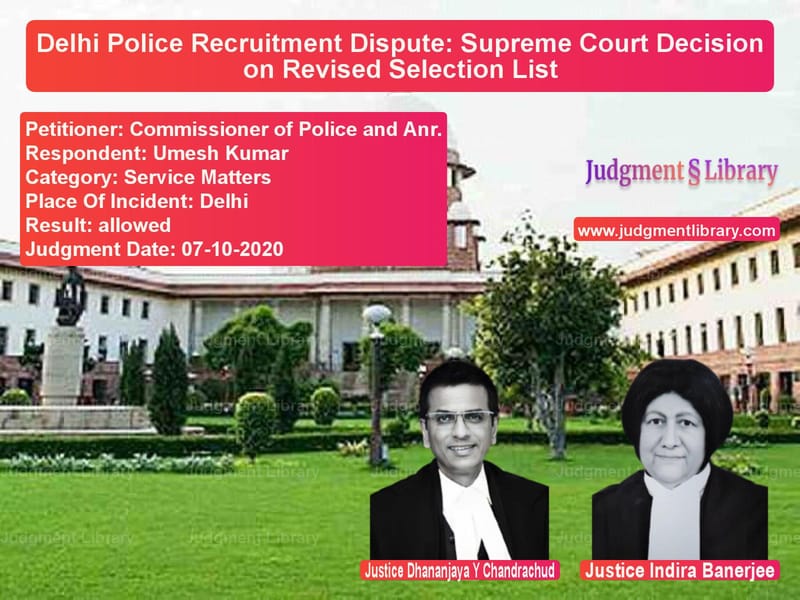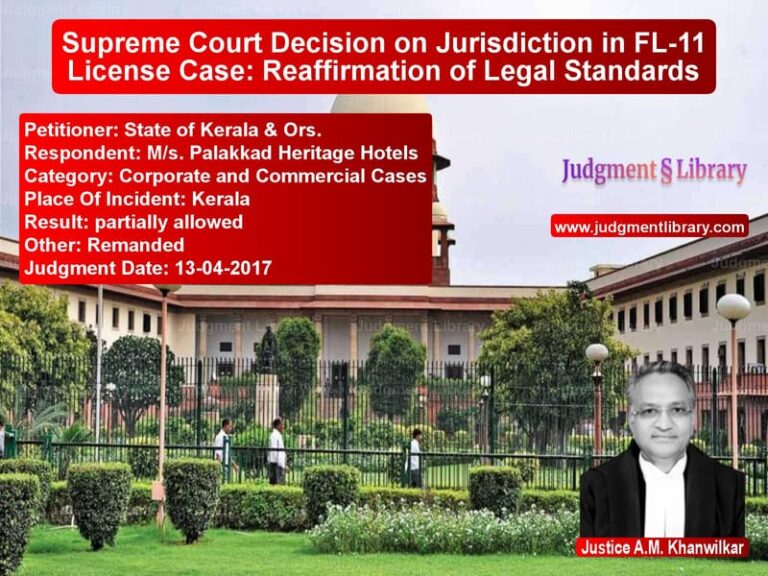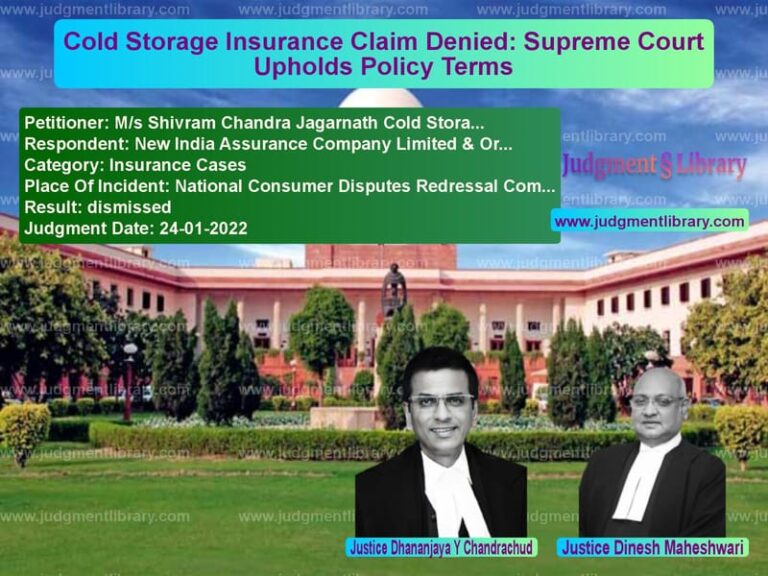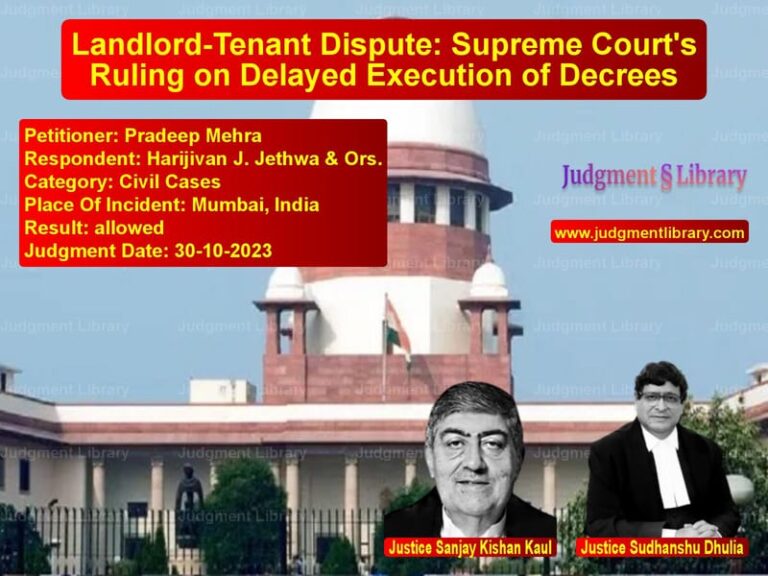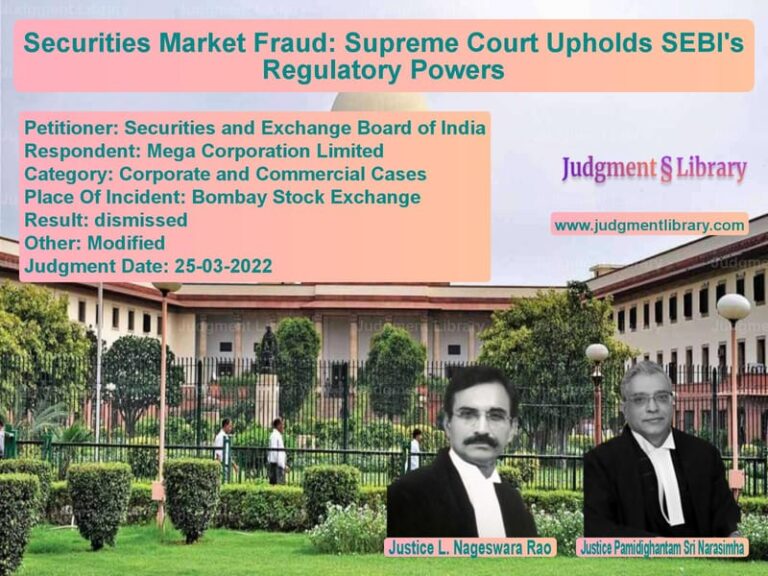Delhi Police Recruitment Dispute: Supreme Court Decision on Revised Selection List
The case of Commissioner of Police and Anr. vs. Umesh Kumar revolves around a dispute concerning the recruitment process for the post of ‘Constable (Executive) – Male’ in the Delhi Police. The Supreme Court had to determine whether the respondents, who were initially selected but later ousted due to a revised result, had a legal right to appointment.
The controversy arose when the Delhi Police revised the results of the recruitment process after identifying errors in the answer key and the allocation of bonus marks for height. The case underscores the importance of fairness in competitive examinations and the principle that selection does not guarantee a vested right to appointment.
Background of the Case
On 27 January 2013, a notice was published for the recruitment of 523 Constables (Executive) – Male in the Delhi Police. A series of physical endurance and measurement tests followed, and candidates who qualified were allotted roll numbers for the written examination. The selection process, however, faced multiple hurdles:
- The written examination was held on 8 March 2014 but later canceled.
- A fresh written examination took place on 25 May 2014, which was also canceled.
- A final examination was conducted on 16 November 2014, leading to a result declaration on 13 July 2015.
However, a major oversight was discovered—bonus marks had not been given to candidates with a height of 178 cm or more, as prescribed in Standing Order No. 212 of 2011. The result was subsequently revised, and a new list of selected candidates was published on 17 July 2015. The respondents, Umesh Kumar and Satyendra Singh, remained in the selection list.
Pleadings of the Parties
Petitioner’s (Commissioner of Police) Arguments
The petitioners contended that:
- The revision of the results was necessary due to complaints regarding the answer key and allocation of marks.
- An Expert Committee was constituted to examine the issues, which found multiple errors in the answer key.
- A further revision of results was undertaken on 22 February 2016, leading to the selection of 129 new candidates and the ousting of 123 previously selected candidates, including the respondents.
- The respondents did not score above the revised OBC category cutoff of 79.49 marks in the new result.
- The Delhi High Court erred in granting the respondents an appointment since no candidate has a vested right to appointment merely because their names appeared in an earlier selection list.
Respondent’s (Umesh Kumar and Satyendra Singh) Arguments
The respondents argued that:
- They had already completed the formalities of recruitment, including medical verification and character verification.
- Their names had appeared in the revised selection list dated 17 July 2015, leading them to believe that their selection was final.
- The process of revising the results again on 22 February 2016 was unfair and caused undue hardship to them.
- As they had already submitted documents and were awaiting appointment, the government should be bound by its own actions.
- The Delhi High Court was correct in ordering their appointment, as their selection had been recognized earlier.
Supreme Court’s Judgment
The Supreme Court analyzed the recruitment process and the impact of revising the results. The key findings were:
- No Vested Right to Appointment: The Court reiterated that the mere inclusion of a candidate in a selection list does not grant them an automatic right to appointment.
- Necessity of Fair Evaluation: The revision of results was justified as it corrected fundamental errors in the answer key and the allocation of bonus marks.
- Recruitment Process Was Incomplete: At the time of revision, no final appointment letters had been issued, meaning the process was still subject to changes.
- Impact of Revised Cut-off Marks: The respondents did not meet the new cutoff for their category and, thus, could not claim discrimination.
- Application of Precedents: The Court relied on previous judgments that emphasized the discretionary nature of appointments and the absence of an enforceable right to employment unless explicitly granted by law.
Key Observations by the Supreme Court
The Supreme Court cited previous rulings to support its decision, stating:
“The mere inclusion of a name in the selection list does not confer a vested right to appointment. Unless the relevant recruitment rules so indicate, the State is under no legal duty to fill up all or any of the vacancies.”
The Court also noted:
“The recruitment process was put in abeyance after challenges were filed before the Tribunal. The revision of the result was necessary to align it with the correct legal standards.”
Conclusion
The Supreme Court set aside the Delhi High Court’s decision, ruling that the respondents were not entitled to appointment as constables in the Delhi Police. The revised results, which followed a lawful and fair process, stood valid.
This judgment highlights the principle that selection in a government recruitment process is subject to scrutiny and modification until the final appointment stage. It reaffirms the need for transparency and fairness while ensuring that procedural errors do not grant undeserved advantages.
Petitioner Name: Commissioner of Police and Anr..Respondent Name: Umesh Kumar.Judgment By: Justice Dhananjaya Y Chandrachud, Justice Indira Banerjee.Place Of Incident: Delhi.Judgment Date: 07-10-2020.
Don’t miss out on the full details! Download the complete judgment in PDF format below and gain valuable insights instantly!
Download Judgment: Commissioner of Poli vs Umesh Kumar Supreme Court of India Judgment Dated 07-10-2020.pdf
Direct Downlaod Judgment: Direct downlaod this Judgment
See all petitions in Recruitment Policies
See all petitions in Public Sector Employees
See all petitions in Employment Disputes
See all petitions in Judgment by Dhananjaya Y Chandrachud
See all petitions in Judgment by Indira Banerjee
See all petitions in allowed
See all petitions in supreme court of India judgments October 2020
See all petitions in 2020 judgments
See all posts in Service Matters Category
See all allowed petitions in Service Matters Category
See all Dismissed petitions in Service Matters Category
See all partially allowed petitions in Service Matters Category

